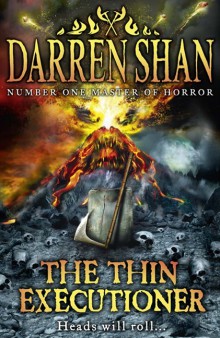The kingdom of Abu Aineh is a place of uncompromising justice, where laws are strict, judges are without mercy, and nothing is so exacting—or revered—as the executioner’s blade. Jebel Rum knows this culture as well as any because the kingdom’s high executioner, Rasheed Rum, is his father. This fact would, under ordinary circumstances, be something to celebrate, for it would ensure Jebel a life of wealth, nobility, and notoriety. But Jebel is third in line for his father’s coveted position and, to make matters worse, he is much too puny for the job. His only chance of becoming the kingdom’s next executioner lies in his ability to successfully quest to Tubaygat—a mythical volcano which is home to the fire-god Sabbah-Eid—where he must sacrifice the blood of a human slave in order to claim the god’s blessing of unparalleled strength, long-life, and invincibility, gifts which would ensure that he, and not his brothers, would take up his father’s axe.
The Thin Executioner, it should be noted, is surprisingly dark and macabre, filled with images and characters that display remarkable greed, prejudice, and violence which the novel displays with shocking force and frequency. Still, these rather unsettling images and characters serve as a dark backdrop against which emerges an intriguingly redemptive story of personal change and growth, and a recognition of the invaluable worth of every human soul. This book is certainly not for the squeamish—its graphic and unsettling depictions of social prejudice and violence are likely to upset some readers—but for those young readers who can stomach or appreciate the sensational, the gothic, or the horrifying in the books they read, this book tells an intriguing story of how even the most ignorant, judgmental, and violent of individuals carry within them a startling capacity for change.
